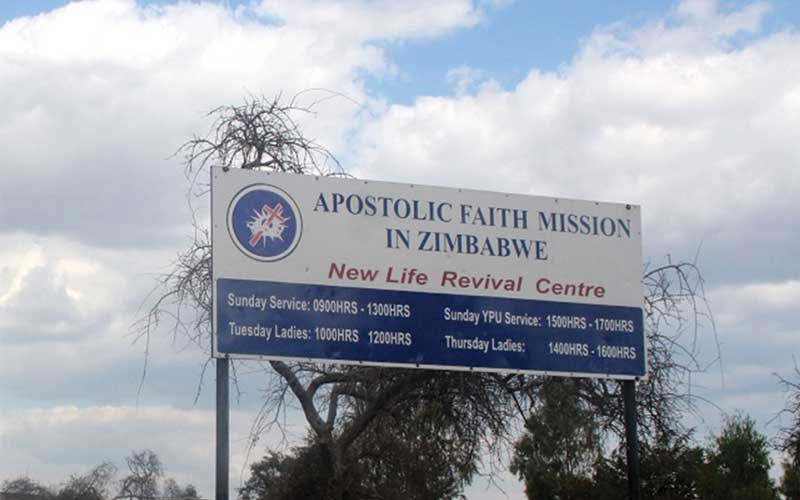
THE recent emergence of the Apostolic Faith Mission of Zimbabwe (AFMOZ), which broke away from the Apostolic Faith Mission in Zimbabwe (AFM) due to factionalism, has placed a bad tag on the faith movement, thrusting congregants into eternal confusion.
The split came after Cossum Chiangwa, the church president allegedly amended the AFM constitution without consulting elders in an attempt to remain in power. According to the AFM constitution, elections are held after every three years to elect a new president and his deputy from a pool of senior pastors.
Concerned pastors have accused Chiangwa of blocking elections and not adhering to the church’s constitution. It is reported that Chiangwa’s tenure had ended with the 65-year age limit for one to preside over the church, under its constitution.
For Regina Mubaka (50) of Chinhoyi, Mashonaland West province, the AFM infighting has dampened the spirits of many members countrywide..
“The AFM saga is now part of religious inheritance challenges faced locally. It drives us away from going to church,” she said.
Archbishop Busani Sibanda of The United Apostolic Faith Church, said churches have not been spared from splits common in political parties and infighting all because of inheritance wrangles.
“Churches must also have clear constitutions that are also in tandem with the supreme law of the land (Zimbabwe Constitution). It must be clear on succession issues, spell out what belongs to the church and what belongs to the leaders of the church,” he said.
“The leaders and members must be reminded of the constitution on all big festivals so that they are not shocked to hear of issues of inheritance once the leader is dead and hear for the first time that what they thought is for the church is for the leader and his family.”
- AFM pastor, and wife arrested for fraud
- Escaping Zhantali’s hand of death . . . survivor narrates ordeal
- Zim artistes train congregants on quality sound production
- Zim artistes train congregants on quality sound production
Keep Reading
He further explained that churches play a pivotal role in unifying communities.
“Churches are there to foster the spirit of oneness and living as one family. We need to share and care for each other during hard and better times,” Sibanda said.
“We must despise greediness and selfishness, while fighting for equality, justice and even distribution of assets, accommodating, education and love each other.”
Hurungwe Pastors Fraternity chairperson Isaac Chamonyonga noted that uneven laws promotes thuggery and ground for breeding of criminal activities in churches.
“Church leadership must lead by example in communities and must desist from greedy approach that affects the congregation. All efforts must be made to make transitional justice that is acceptable by both incoming and outgoing members. Church is the light in darkness and needs to be called upon as following the right path” Chamonyonga said.
Federation For Indigenous Churches of Zimbabwe secretary-general Mathias Tsine said the church has turned a blind eye to most of the things outside spirituality.
“Its composition is not reminiscent of a family set-up whereby inheritance is part and parcel of a funeral and soon thereafter. Inheritance is rarely a pulpit message particularly on church property and leadership, this topic remains sacred given that it has a lot of negative misinterpretations. The traditional role of the church was/is to preach about repentance, live a Christ-like life and inherit the Kingdom of Heaven, with great emphasis on abstaining from the love of earth properties and wealth. It is against this background that the notion ‘matambudziko panyika rugare kudenga’ [Peace is only found in heaven] manifested,” he said.
Tsine further explained that some churches have gone further to dwell on the gospel of prosperity, while others are emphasising on the establishment of infrastructure and other economic activities within their establishment.
“The church has remained blind to the hereafter, ignoring the future of the church upon the promotion to glory of the presiding leader. It is at this juncture where disagreements over succession and inheritance take centre stage,” he added.
Tsines believes a constitution, a well-defined succession and inheritance policy can help resolve fights over inheritance of both the church leadership and the properties.
“The role of the organisation is then to ensure that those who remain adhere to the dictates of the particular church constitution. Unfortunately, we have other scenarios where properties, instead of being registered in the name of the church, are registered in the name of individuals like the current leader. We have such denominations that operate as if they are personal entities where everything seemingly belongs to the leader. In the absence of a constitution, a will or when the constitution is silent on this subject chaos is likely to be the eventuality,” he added.
Of late inheritance challenges have left families divided.
Today, Mubaka is uncertain about her future at AFM. She prays the wrangle be solved amicably for the betterment of the church.










